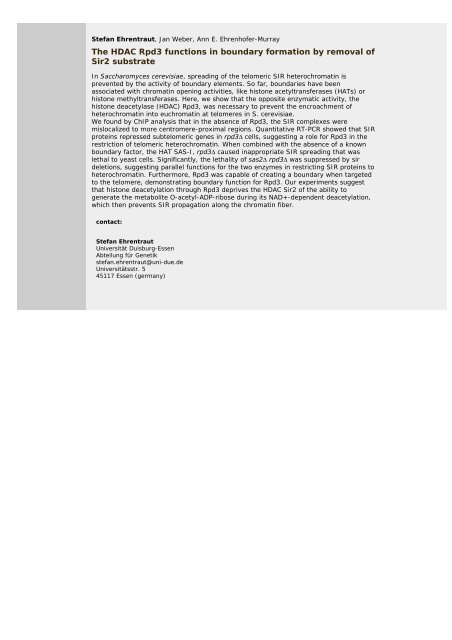Abstracts (poster) - Wissenschaft Online
Abstracts (poster) - Wissenschaft Online
Abstracts (poster) - Wissenschaft Online
Create successful ePaper yourself
Turn your PDF publications into a flip-book with our unique Google optimized e-Paper software.
Stefan Ehrentraut, Jan Weber, Ann E. Ehrenhofer-Murray<br />
The HDAC Rpd3 functions in boundary formation by removal of<br />
Sir2 substrate<br />
In Saccharomyces cerevisiae, spreading of the telomeric SIR heterochromatin is<br />
prevented by the activity of boundary elements. So far, boundaries have been<br />
associated with chromatin opening activities, like histone acetyltransferases (HATs) or<br />
histone methyltransferases. Here, we show that the opposite enzymatic activity, the<br />
histone deacetylase (HDAC) Rpd3, was necessary to prevent the encroachment of<br />
heterochromatin into euchromatin at telomeres in S. cerevisiae.<br />
We found by ChIP analysis that in the absence of Rpd3, the SIR complexes were<br />
mislocalized to more centromere-proximal regions. Quantitative RT-PCR showed that SIR<br />
proteins repressed subtelomeric genes in rpd3Δ cells, suggesting a role for Rpd3 in the<br />
restriction of telomeric heterochromatin. When combined with the absence of a known<br />
boundary factor, the HAT SAS-I, rpd3Δ caused inappropriate SIR spreading that was<br />
lethal to yeast cells. Significantly, the lethality of sas2Δ rpd3Δ was suppressed by sir<br />
deletions, suggesting parallel functions for the two enzymes in restricting SIR proteins to<br />
heterochromatin. Furthermore, Rpd3 was capable of creating a boundary when targeted<br />
to the telomere, demonstrating boundary function for Rpd3. Our experiments suggest<br />
that histone deacetylation through Rpd3 deprives the HDAC Sir2 of the ability to<br />
generate the metabolite O-acetyl-ADP-ribose during its NAD+-dependent deacetylation,<br />
which then prevents SIR propagation along the chromatin fiber.<br />
contact:<br />
Stefan Ehrentraut<br />
Universität Duisburg-Essen<br />
Abteilung für Genetik<br />
stefan.ehrentraut@uni-due.de<br />
Universitätsstr. 5<br />
45117 Essen (germany)

















